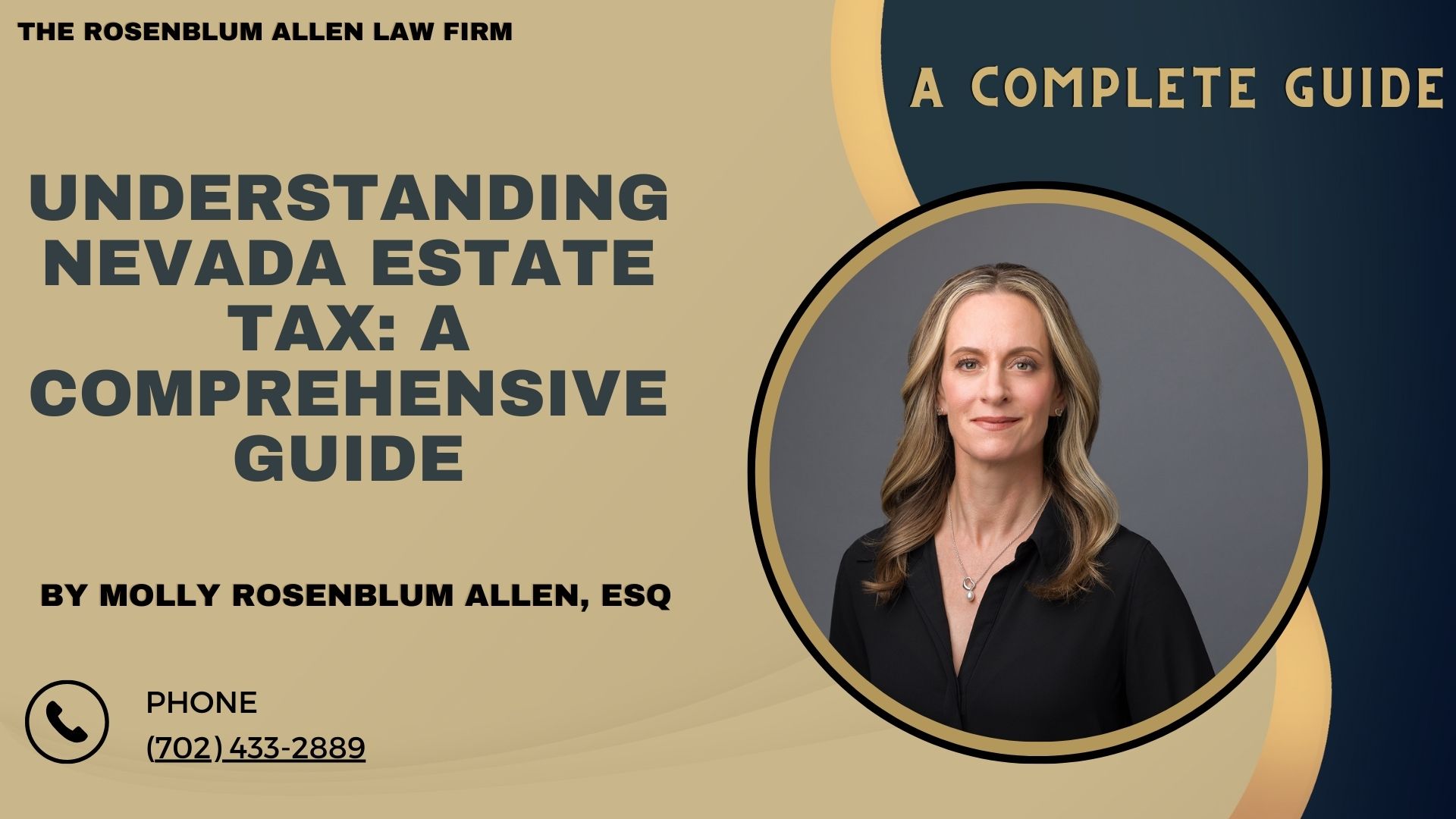In estate planning, it’s crucial to understand your state’s tax laws. This means grappling with the estate tax concept. It applies to Nevada residents or property owners. The topic is often confusing. This guide aims to explain Nevada estate tax. It offers clarity and insights to help you navigate this complex area. Whether you’re planning or just curious about the laws, we’re here to guide you. We’ll cover the basics of Nevada’s estate taxation.
Note: Make sure to also check out our Nevada Inheritance Tax post while you’re here.

Nevada Estate Tax Overview
History of Nevada Estate Tax
Nevada’s view on estate tax has changed. It has followed national trends and laws. Historically, Nevada, like many states, had an estate tax. The state death tax credit linked it to the federal estate tax. But, national changes have shifted estate taxation in Nevada.
Current Status of Nevada Estate Tax
Explanation of the Nevada Estate Tax Repeal
In response to federal changes, Nevada has repealed its estate tax. As of now, Nevada does not impose an estate tax on its residents. This includes people who own real estate or tangible property in the state. This repeal enhances Nevada’s tax-friendly reputation, especially compared to states that still impose estate taxes.
Comparison with Federal Estate Tax
Nevada repealed its estate tax. But, Nevada residents still need to understand how the federal estate tax might affect them. The federal government imposes an estate tax on the transfer of the decedent’s estate. It has specific exemptions and rates. Understanding the interplay is crucial. Nevada lacks a state estate tax. But, there is potential for federal estate tax liability. This is crucial for estate planning.

Understanding the Federal Estate Tax
Federal Estate Tax Basics
The federal estate tax is a tax on the transfer of the estate of a deceased person. Understanding this tax is essential. It includes the exemptions and rates. You need to see how it might affect your estate planning.
Exemptions and Rates
The government periodically adjusts the federal estate tax exemption amount for inflation. For example, in recent years, the exemption has been set at over $11 million for individuals. This effectively exempts most estates from federal estate tax. The rates for estates above this exemption level can be substantial, reaching up to 40%.
How the Federal Estate Tax is Calculated
Calculating the federal estate tax involves several steps. It starts with the gross estate value. You subtract allowable deductions (like debts, funeral expenses, and charitable donations). Then, you apply for the exemption. The tax rate applies to the amount above the exemption. It can vary, increasing the estate’s tax.
Impact on Nevada Residents
For Nevada residents, the federal estate tax is their main concern. It is their primary worry for estate tax. Nevada does not have an estate tax. But, the federal government may tax high-value estates. Understanding this potential liability is a critical component of effective estate planning.
This introduces Nevada and federal estate tax. It sets the stage for a dive into estate planning in Nevada. With this knowledge, residents can confidently plan their estates. They know they’re well-informed about taxes.

Estate Planning in Nevada
Estate planning might sound daunting, especially in a state without an estate tax. Still, you must ensure that you distribute your assets as you wish. Do this after you’re gone. In Nevada, the process has many key parts. Each plays a unique role in protecting your legacy.
Importance of Estate Planning in a No Estate Tax State
You might wonder why estate planning is necessary in a state like Nevada, where there’s no estate tax. The answer is simple: estate planning is much more than tax avoidance. Ensuring that you care for your loved ones is important. You can distribute your assets as you wish. We respect your healthcare wishes when you are unable to express them.
Critical Components of a Comprehensive Estate Plan
A well-rounded estate plan in Nevada should include several essential elements:
Will Creation and Trusts: Your will is your voice after you’re gone, dictating how your assets should be distributed. Trusts can help manage your assets, avoiding probate and maintaining privacy.
Power of Attorney and Healthcare Directives: These documents ensure that someone you trust can make financial and medical decisions on your behalf if you cannot do so.
Beneficiary Designations and Asset Titling: These elements dictate how certain assets are transferred upon death, often bypassing the will and probate process.
Nevada-Specific Considerations
Nevada’s legal landscape offers unique opportunities and challenges for estate planning:
Community Property Laws: Nevada is a community property state, meaning assets acquired during marriage are generally owned equally by both spouses. This can impact how assets are distributed upon death.
Probate Process in Nevada: Understanding Nevada’s probate process is crucial. While trusts can help avoid probate for some assets, knowing the process can help you plan more effectively.

Strategies to Minimize Estate Taxes and Protect Assets
Even without a state estate tax, you can use strategies to protect your assets. You can also reduce the federal estate tax’s impact. You can ensure that your loved ones receive your estate by using these strategies. They do so as efficiently as possible.
Gift Taxes and Annual Exclusions
The IRS allows you to give a certain amount to as many people as you wish each year. Those gifts don’t count against your lifetime estate and gift tax exemption. Utilizing this can reduce your taxable estate without incurring gift tax liability.
Strategies for Gifting During One’s Lifetime: Regularly gifting up to the annual exclusion amount can significantly reduce the size of your estate over time, potentially lowering or eliminating federal estate tax liability.
Trusts and Their Role in Estate Planning
Trusts are key to good estate planning. They provide control over asset distribution and privacy benefits.
Revocable vs. Irrevocable Trusts: Revocable trusts allow for changes during your lifetime, while irrevocable trusts do not but offer more excellent protection against estate taxes and creditors.
Specialized Trusts for Asset Protection and Tax Minimization: Certain trusts, like irrevocable life insurance trusts (ILITs) or charitable remainder trusts (CRTs), can offer specific tax advantages and asset protection benefits.
Charitable Contributions and Their Tax Implications
Giving to charity can cut your taxable estate. It also supports causes that matter to you.
Strategies for Incorporating Charitable Giving into Your Estate Plan: Establishing a charitable trust or naming a charity as a beneficiary in your will or retirement accounts can provide tax benefits and meet your philanthropic goals.

Legal and Financial Advice
Crafting a full estate plan in Nevada requires effective specialists. It reduces estate taxes and protects assets.
The Role of Estate Planning Attorneys and Financial Advisors
They can give invaluable guidance. They will help you with estate planning, tax laws, and asset protection.
When to Consult a Professional: Consider seeking professional advice when starting your estate planning if your financial situation changes significantly or if you need to update your existing estate plan.
What to Expect from a Consultation: A consultation should provide you with a clear understanding of your estate planning options, the legal and financial strategies applicable to your situation, and a road map for implementing your plan.
Resources for Finding Qualified Professionals in Nevada
Finding the right professionals is vital to effective estate planning. Look for lawyers and financial advisors with experience in Nevada estate law. Consider seeking recommendations from trusted friends or professional groups.

Breaking It All Down
Nevada has no state estate tax. But, estate planning there still needs thought. You must ensure that you keep your assets safe and that others honor your wishes. You need to understand the federal estate tax’s impact. You must also navigate Nevada’s community property laws. And, use strategies to cut taxes and protect assets. There’s much to consider. But, with the right guidance and a full plan, you can confidently secure your legacy. You can also provide for your loved ones.

Frequently Asked Questions
What happens if I die without a will in Nevada?
If you pass away without a will in Nevada, the state determines how your assets are distributed according to its intestacy laws. This may not align with your preferences, typically prioritizing spouses, children, and close relatives.
How can I ensure the care of my minor children after my passing?
You can designate a guardian for your minor children in your will to ensure they are cared for by someone you trust. Additionally, setting up a trust can manage the assets left for your children until they reach an appropriate age.
Are digital assets considered in estate planning in Nevada?
Yes, digital assets such as social media accounts and online banking should be included in your estate plan. Specify how these assets should be handled and who can access them in your estate planning documents.
How frequently should I review and update my estate plan?
It’s advisable to review and update your estate plan every three to five years, as well as after significant life events like marriage, divorce, the birth of a child, or major financial changes. This ensures your plan reflects your current wishes and circumstances.
Can I modify my living trust once it’s established?
If you’ve established a revocable living trust, you can change or revoke it at any time during your lifetime. This flexibility allows adjustments as your situation evolves. However, an irrevocable trust cannot be changed except under specific circumstances.
What’s the distinction between a living will and a healthcare power of attorney in Nevada?
A living will outlines your medical treatment preferences if you’re unable to communicate them, while a healthcare power of attorney appoints someone to make healthcare decisions on your behalf if you’re incapacitated. Both are essential components of comprehensive healthcare planning.
Is it possible to prevent family disputes over my estate?
While disputes can’t be entirely guaranteed, stating your wishes clearly in your estate plan and communicating them to your family can help minimize conflicts. Involving a professional can ensure your plans are well-documented and legally sound.
Do I need an estate plan if I don’t have significant assets?
Yes, estate planning isn’t solely for the wealthy. It’s about expressing your wishes, appointing guardians for minor children, and ensuring your assets are distributed as desired, regardless of their size. Additionally, estate planning encompasses essential healthcare directives for everyone.

Glossary
Asset: Any form of property or resource with economic value owned by an individual or corporation expected to provide future benefits.
Beneficiary: A person or entity designated to receive benefits or assets from a will, trust, insurance policy, or other legal instrument.
Community Property: A form of joint property ownership typically between spouses, where assets acquired during the marriage are considered jointly owned.
Estate: The total assets owned by an individual at the time of their death, including property, cash, and investments, minus any liabilities.
Estate Planning: The process of arranging the management and disposal of a person’s estate during their life and after death, including the drafting of legal documents such as wills and trusts.
Estate Tax: A tax levied on an individual’s estate after their death, based on the value of their assets. This can be at the federal or state level, though Nevada currently does not impose an estate tax.
Guardian: An individual or entity appointed to care for a minor child or an adult with special needs if the parents or previous guardian are unable to do so.
Intestacy Laws: State laws that determine how assets are distributed if a person dies without a valid will.
Irrevocable Trust: A trust that, once established, cannot be altered, amended, or revoked by the grantor. Assets placed into the trust are permanently removed from the grantor’s possession.
Living Trust: A legal document created during an individual’s lifetime that holds and manages assets for the benefit of designated beneficiaries, which can be revocable or irrevocable.
Living Will: A legal document that records a person’s wishes regarding medical treatment in circumstances where they are no longer able to express informed consent.
Probate: The legal process through which a deceased person’s estate is properly distributed to heirs and designated beneficiaries and any debt owed to creditors is paid off.
Revocable Trust: A trust that can be altered or canceled by the grantor during their lifetime. Assets in the trust are considered part of the grantor’s estate for tax purposes.
Trust: A fiduciary arrangement that allows a third party, or trustee, to hold assets on behalf of a beneficiary or beneficiaries.
Will: A legal document in which a person, the testator, expresses their wishes as to how their property is to be distributed at death and names one or more persons, the executor, to manage the estate until its final distribution.

Additional Resources for You
Las Vegas Estate Planning Attorney: Offering comprehensive estate planning services tailored for Las Vegas residents, including wills, trusts, and more. Find out how to protect your assets and ensure your wishes are honored. Visit here
Las Vegas Trust Attorney: Specialized legal services for creating and managing trusts in Las Vegas. Discover the benefits of a trust for your estate planning needs. Learn more
Tips On Estate Planning: Essential tips and advice for effective estate planning. A valuable resource for anyone starting their estate planning journey. Read tips
Estate Planning Checklist: A comprehensive checklist to guide you through the estate planning process in Las Vegas. Ensure you cover all bases for peace of mind. Access the checklist
Making a Will: Detailed guidance on creating a will in Las Vegas, an essential component of estate planning. Understand the process and what needs to be included. Find out how
Estate Planning Services: Explore the range of estate planning services offered to Las Vegas residents. From simple wills to complex trust structures, find the support you need. Explore services
Estate Planning Mistakes: Learn about common estate planning mistakes to avoid. This resource helps you navigate potential pitfalls and make informed decisions. Avoid mistakes
Estate Planning Probate: Insights into the probate process in Las Vegas and how to plan your estate to minimize complications and ensure a smooth transition of your assets. Understand probate

Outside Resources for You
American Bar Association (ABA): The ABA’s website offers a wealth of resources on legal topics, including estate planning, providing guidance and tools for both the public and legal professionals.
National Association of Estate Planners & Councils (NAEPC): NAEPC is dedicated to promoting excellence in estate planning by providing its members and the public with education, networking opportunities, and professional accreditation in the estate planning field.
ElderLawAnswers: This site focuses on elder law, long-term care planning, and estate planning. It provides articles, resources, and a directory of attorneys specializing in these areas.
WealthCounsel: WealthCounsel offers a community for estate planning professionals, with resources that include educational materials and tools for drafting estate plans.
National Academy of Elder Law Attorneys (NAELA): NAELA is a professional association of attorneys who specialize in areas of law affecting older adults and people with disabilities, including estate planning and probate issues.
Rocket Lawyer: While not a substitute for personalized legal advice, Rocket Lawyer provides legal documents and information that can be helpful for those looking to understand basic estate planning documents before consulting an attorney.
FindLaw: FindLaw offers a comprehensive library of legal information and resources, including articles on estate planning, wills, trusts, and how to find and work with attorneys.

A Special Message from Our Lead Attorney, Molly Rosenblum Allen, Esq

Dear Reader,
Thank you so much for taking the time to explore our resources. We hope you found the information insightful. It should help as you navigate the complexities of estate planning. At The Rosenblum Allen Law Firm, we know the plan must meet your needs. It must give you and your loved ones peace of mind.
If you’re ready to take the next step or have any questions about your situation, we invite you to call us at (702) 433-2889. My team and I are here to guide you. We will help with every part of estate planning. We will ensure that we honor your wishes and protect your assets.
We look forward to the chance to work with you. We will help bring clarity and confidence to your estate planning.
Warmest regards,
Molly and the Team at The Rosenblum Allen Law Firm




